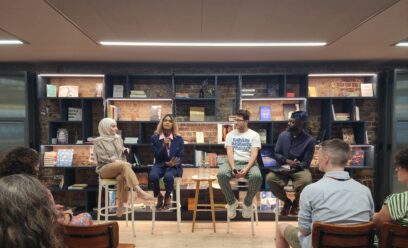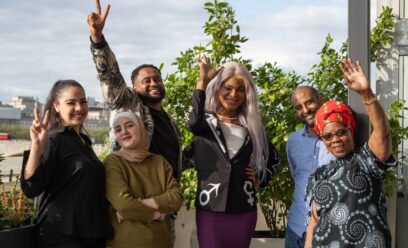‘A big motivating factor is my parents’ stories and background; if it had not been for the kindness of strangers I would not be here.’
Posted by IMIX on January 26, 2024Helen Singer’s parents came to Britain as refugees from Nazi Germany. She reflects on how their journey influenced her work supporting others seeking sanctuary in Hertfordshire, the importance of telling their stories and how we can better support those in search of refuge in the UK today.
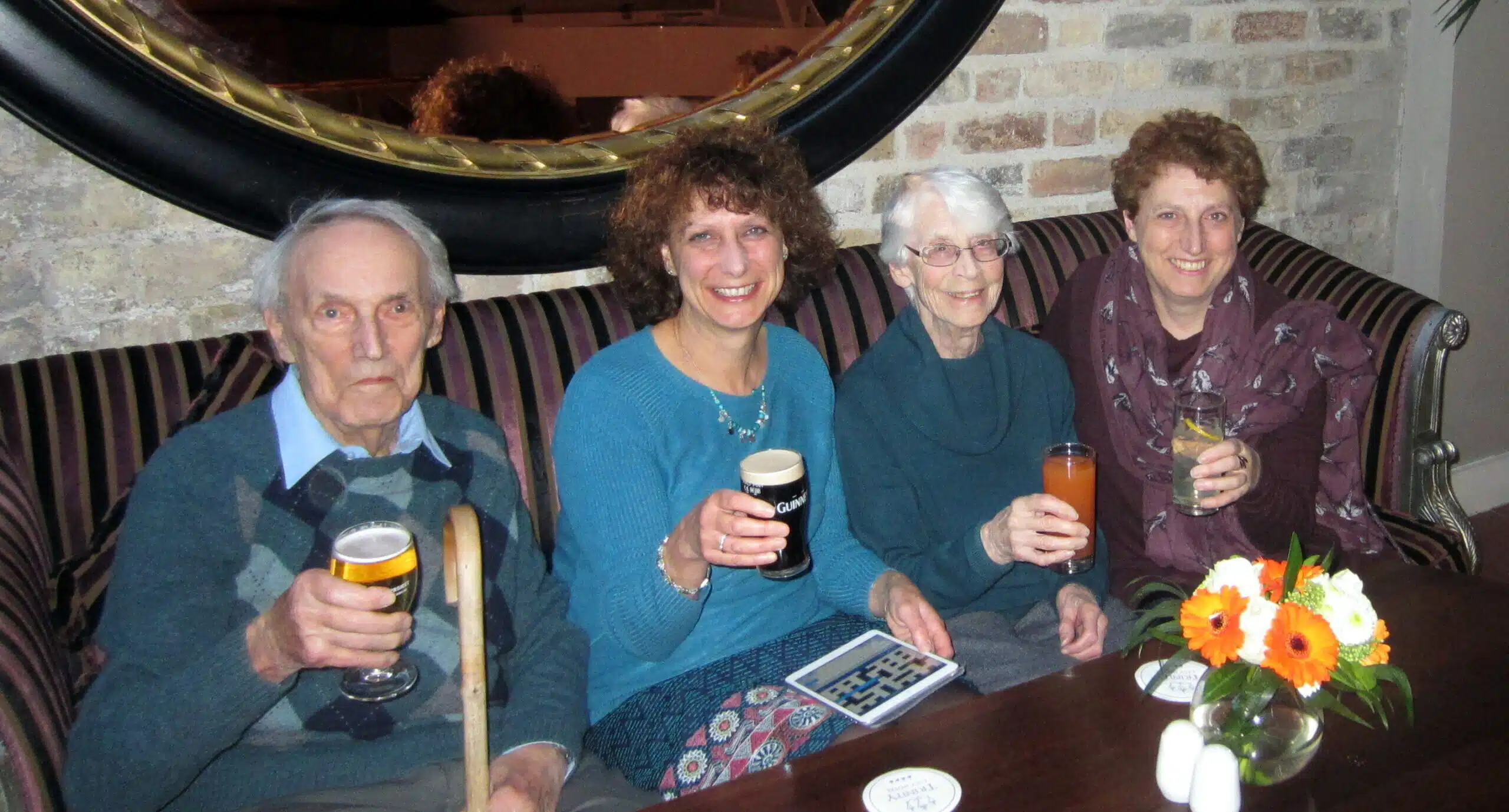
Helen and her twin sister Debbie, with their parents Hanna and Peter in 2016.
Both my parents are from Jewish families and came to England fleeing Nazi Germany. My father Peter came to school here in 1937. After Kristallnacht in November 1938, my grandfather was sent to the Dachau concentration camp. Fortunately, with support from the West London Synagogue and my father’s headmaster at Farnham Grammar School, my grandparents were able to join him in May 1939.
My mother Hanna came to England on the Kindertransport, a rescue effort that brought nearly 10,000 refugee children to the UK from Nazi territories, with her twin brother Gerald in July 1939. An English Jewish friend of my grandmother kindly sponsored my grandmother to come here on a domestic visa; she also secured a nursing visa for my aunt and school places for my mother and uncle. Unfortunately, my grandfather Willy Cohn was too old to get a visa and was deported and murdered in Auschwitz.
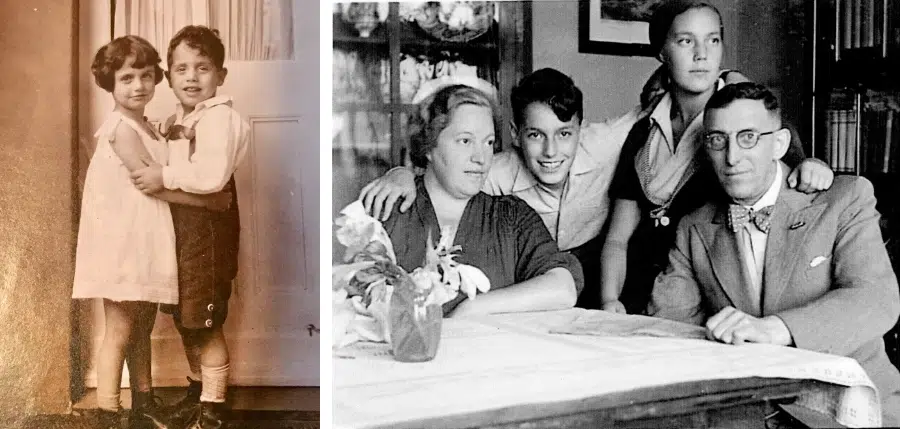
On the left: Helen’s mother Hanna with her twin brother Gerald. On the right: Helen’s father Peter with his family in Germany.
I think it was tough for my parents when they first got here as they moved around a lot. They met through a social club for refugees from Germany and Austria, married in 1955 and settled in North London. My twin sister Debbie and I were born in 1958. Our mother became an English teacher and our father worked in manufacturing. Our parents were both very grateful to make their home here and our mother wrote that she was so pleased that her children would be brought up English. They were keen to integrate into English life so although they didn’t hide anything from us, they didn’t make a big deal of their journeys. Our grandparents had strong German accents, but we always spoke English so when I studied German later, I had to start from scratch! From them I think I learnt to be positive and interested in others.
Spending time in Germany in the late 1970s made me think about what had happened to my parents’ families. More recently it seems important not to forget their stories, or those of so many like them, especially when we see the rise of the right wing and the attempt to dehumanise anyone different.
I think I have quite an international outlook, studying languages and working for the British Council and later at the University of Hertfordshire where I really enjoyed meeting students from all over the world. I started volunteering for the Refugee Council when Syrian refugees arrived in Hertfordshire and have been volunteering with Herts Welcomes Refugees for many years and I now coordinate their social media. I try to tell people’s stories to help others empathise and understand what it must be like to arrive here under the most difficult circumstances. A big motivating factor is my parents’ stories and background; if it had not been for the kindness of strangers I would not be here.
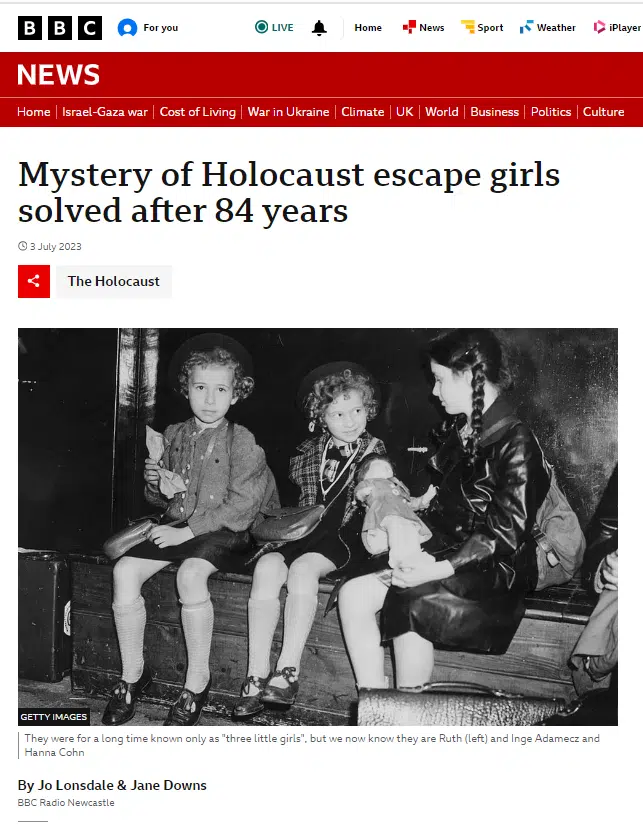
Press coverage about the Kindertransport photograph. Helen’s mother, Hanna, is on the right with plaits.
In 1990, my uncle came across a photograph of three little girls arriving at Liverpool Street Station in July 1939 at an exhibition following the 50th anniversary of the Kindertransport. He recognised my mother by her coat. We always wondered who the other girls were. The photograph took on a life of its own and has been used in books, newspapers and media. We were always touched to see it represent how so many Jewish children were saved. However, each child needed a sponsor, and £50 which was equivalent to £2000 in today’s money. The children were also separated from their parents and the majority never saw their parents again which must have been a huge trauma.
It wasn’t until January 2023 that two BBC journalists, Jo Lonsdale and Jane Downs identified the other girls in the photograph, Inge Adamecz and her sister Ruth and we got in touch with Jo and Jane. They arranged for us to meet Inge at the Imperial War Museum. She is an amazingly youthful woman – she is 90 now. Despite her difficult start in life, she is very positive and says she has had a good life. Our mother died in 2018 but we think she would have been happy that we met Inge. We were very pleased that Getty Images, who own the photograph, have amended the record to include the names of our mother Hanna, and Inge and Ruth as we feel it is important that refugees are named.
Refugee children should be nurtured, given stability and not moved around from place to place when hotels are closed at short notice. I think family reunions should be a priority now so that unaccompanied children are able to be with family members. I am so proud of all the volunteers at Herts Welcomes Refugees who work with families in Hertfordshire hotels where they are waiting for their asylum claims to be heard. The children are doing well at school and the activities set up by volunteers, for example cooking, art, walks and outings are a way of helping them feel cared for and welcome.
We can campaign for refugee children by writing letters to our MPs, the press, or giving radio interviews, and by supporting and volunteering with refugee charities. Another way is to share personal stories, whilst protecting the children’s anonymity, to encourage empathy and compassion.
The government needs to provide safe routes and swift asylum decisions to those seeking sanctuary. Councils should be supported to house those given leave to remain and a longer notice period should be given than the current 28 days. Asylum seekers should be allowed to work, and they themselves want to contribute to society. I truly believe that most people in this country are hospitable. If people put themselves in the position of those forced to flee their home, and the terrible choices that often involves, they will be sympathetic and supportive.

